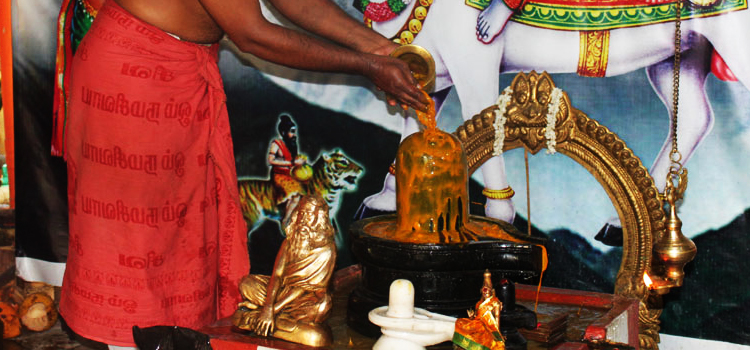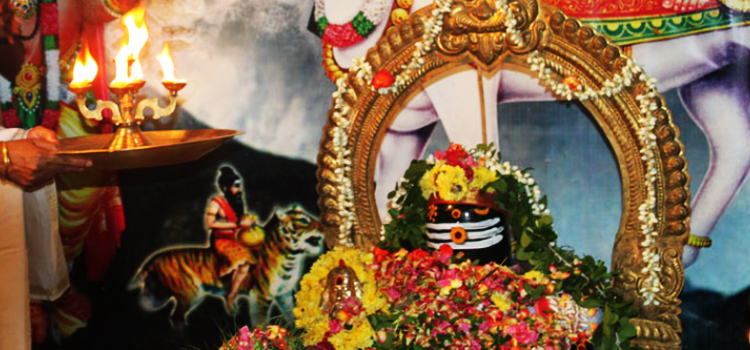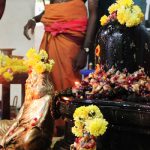Introduction
The 13th moon phase is a distinctive window for Shiva as he dissolves negative karma. It is the best time to resolve old habitual patterns, erase negative energy and karma, and remove limitations that curb progress in one’s life. Pradosham means the removal of sin. In Sanskrit, ‘Pra’ means removal, and ‘Dosham’ means inauspicious events or karma. It is observed across South India to seek blessings of Shiva. It is a specific period of astrological importance occurring every day.
Pradosham is a bi-monthly occasion that occurs on the thirteenth day of every fortnight. Closely linked to the worship of Shiva, the auspicious three-hour period, one and a half hours before and after sunset, is the crucial time for worshipping Shiva.
| Day | Date | From | To | Details |
|---|---|---|---|---|
| Wednesday | January 08 | 17:53 | 20:26 | Pradosh Vrat (S) |
| Wednesday | January 22 | 18:01 | 20:32 | Pradosh Vrat (K) |
| Friday | February 07 | 18:08 | 18:31 | Pradosh Vrat (S) |
| Thursday | February 20 | 18:12 | 20:40 | Pradosh Vrat (K) |
| Saturday | March 07 | 18:15 | 20:40 | Shani Pradosh Vrat (S) |
| Saturday | March 21 | 18:16 | 20:40 | Shani Pradosh Vrat (K) |
| Sunday | April 05 | 19:24 | 20:38 | Pradosh Vrat (S) |
| Monday | April 20 | 18:18 | 20:38 | Soma Pradosh Vrat (K) |
| Tuesday | May 05 | 18:21 | 20:38 | Bhauma Pradosh Vrat (S) |
| Tuesday | May 19 | 18:24 | 20:41 | Bhauma Pradosh Vrat (K) |
| Wednesday | June 03 | 18:29 | 20:44 | Pradosh Vrat (S) |
| Thursday | June 18 | 18:33 | 20:48 | Pradosh Vrat (K) |
| Thursday | July 02 | 18:35 | 20:50 | Pradosh Vrat (S) |
| Saturday | July 18 | 18:35 | 20:51 | Shani Pradosh Vrat (K) |
| Saturday | August 01 | 18:32 | 20:49 | Shani Pradosh Vrat (S) |
| Sunday | August 16 | 18:25 | 20:44 | Pradosh Vrat (K) |
| Sunday | August 30 | 18:17 | 20:38 | Pradosh Vrat (S) |
| Tuesday | September 15 | 18:06 | 20:29 | Bhauma Pradosh Vrat (K) |
| Tuesday | September 29 | 17:56 | 20:21 | Bhauma Pradosh Vrat (S) |
| Wednesday | October 14 | 17:46 | 20:13 | Pradosh Vrat (K) |
| Wednesday | October 28 | 17:39 | 20:09 | Pradosh Vrat (S) |
| Friday | November 13 | 17:35 | 17:58 | Pradosh Vrat (K) |
| Friday | November 27 | 17:35 | 20:08 | Pradosh Vrat (S) |
| Saturday | December 12 | 17:40 | 20:13 | Shani Pradosh Vrat (K) |
| Sunday | December 27 | 17:47 | 20:20 | Pradosh Vrat (S) |
Origin of Pradosham
Pradosham was the son of Kalpa and Dosha. He had two brothers Nishita and Vyustha, namely beginning, middle, and end of the night. Shukla Paksha is from every New Moon day to every Full Moon day. Krishna Paksha is from every Full Moon day to every New Moon day. Pradosha occurs on every Paksha, every month, at the point of time when Trayodashi (13th day of the fortnight) meets the end of Dwadashi (12th day of the fortnight).
Legend of Pradosham
The Asuras – Danavas and Daityas were troubling the Devas, celestial deities. The Devas approached Shiva during the most beneficial moments of Pradosham and sought relief from the Asuras. They ran around Mount Kailasa, Shiva’s abode, aided by Shiva’s bull, Nandi, on a Triyodashi evening. Shiva supported the Devas in killing the Asuras. From then onwards, the practice of worshipping Shiva with his bull Nandi on Trayodashi became a practice, which is relevant in Shiva temples today.
Another legend has it that the Devas (celestial beings) and Asuras(demons) were churning the cosmic ocean to attain Amritham(nectar) that would give them immortality. They used Mount Meru as the churning stick and Vasuki, the snake as the rope. The churning of the milk ocean brought divine gifts like the elephant Airawath and Sri Lakshmi, Goddess of Wealth. As they churned vigorously, Vasuki felt severe abrasions and spat poison that fell into the nectar. It released deadly, poisonous fumes and caused pain and distress.
The Devas became terrified and cried out to Shiva for help. Shiva was compassionate and rescued them by swallowing the poison, when Goddess Parvati afraid it would kill him, put her hand to his throat and held it, preventing it from entering his stomach. Shiva is thus called Neelakanta. It was a time when Shiva descended into the consciousness of people and gave them awareness. The Devas realized their sin and pleaded with Shiva for forgiveness on Trayodashi (13th Moon phase), and he blessed them when they offered prayers and performed pooja.
Tradition of Pradosham
During Pradosham, people worship Shiva’s bull Nandi, across all Shiva temples in South India. The temple takes out a procession of the idols of Shiva with his consort Parvati seated on Nandi in the temple premises.
During the three – hour Pradosham period, people undertake a fast called the Pradosham Vrat, which further adds to the divinity to the day. Pradosham not only cleanses the body system but also dissolves harmful, energy, karma, sins, and paves the way for liberation. Devotees wear Rudraksha (sacred beads), wear Vibhuthi (holy ash), and perform Abhishekam (sacred wash), with offerings of sandal paste, Bilva leaves, a fragrance like incense sticks, Deepa (lamp) and Naivethanam (food offering). These are sacred rituals that follow tradition.
Some people observe a 24-hour Vrat (fast) while others observe fasting from sunrise to sunset. They break the fast after performing pooja for Shiva. Devotees also visit Shiva temples and perform Abhishekam (sacred wash), which is highly favorable.

Importance of Pradosham
Pradosham usually occurs in the evenings. The smaller energy-level Pradoshams occur around every evening, starting one and a half hours before and up to sunset. The middle energy-level Pradosham occurs twice a month, two days before a Full Moon day or a New Moon day. It takes place on the 13th day of each Lunar fortnight, both in Shukla Paksha and Krishna Paksha.
The larger Pradosham takes place when a 13th moon falls on a Saturday. Shani is the God of Karma and teaches us lessons in refining our character by putting obstacles in our path or causing delays. Observing the Shani Pradosham helps to evolve our souls. Shiva has a profound influence on Shani and offering prayers to Shiva, causes Shani to loosen karmic bonds of devotees.
During this period, the earth receives concentrated energy that dissolves stubborn and negative thoughts deeply embedded in one’s psyche. Invoke Shiva in your thoughts and break away from old, negative patterns. Release all negative energy and negative karmic blocks that impede your path, and pave the way for peace, progress, and prosperity. The 13th Moon phase is a time of spiritual awakening and opens the consciousness of the mind to reality. The spiritual awakening moves away from material comforts and worldly possessions.
Significance of Shani Pradosham
Shani Pradosham is associated with the Mahakaleshwar temple in Ujjain, Madhya Pradesh. King Chandrasena was an ardent devotee of Shiva and worshipped him worth deep fervor. God blessed him with a celestial gem of miraculous virtue. Rivals kings plotted and planned to attack Ujjain and possess the treasure. The enemies attacked on Triyodashi, assisted by the powerful demon Dushan. Shiva’s devotees pleaded for help, and God appeared as Mahakal (a form of light) destroying Chandrasen’s enemies. He resided in the city in a Lingam as the chief deity.
Pradosham Days and Benefits
Monday – Soma Pradosham – Erases negativity from life and makes people think positively
Tuesday – Bhauma Pradosham- Cures illness and diseases, increases longevity
Wednesday – Saumya Vaara Pradosham – Enhances knowledge and education
Thursday – Guruvaara Pradosham – Protects against existing danger and concerns
Friday – Brighu Vaara Pradosham – Eliminates negative energies and opposition
Saturday -Shani Pradosham – Progresses career, recovers financial losses
Sunday – Bhaanu Vaara Pradosham – Gives peace and liberation from karmic sins


Can you be more specific about the content of your article? After reading it, I still have some doubts. Hope you can help me.
Thanks for sharing. I read many of your blog posts, cool, your blog is very good.
I don’t think the title of your article matches the content lol. Just kidding, mainly because I had some doubts after reading the article.
I don’t think the title of your article matches the content lol. Just kidding, mainly because I had some doubts after reading the article.
I don’t think the title of your article matches the content lol. Just kidding, mainly because I had some doubts after reading the article. http://295934.cryptostarthome.com